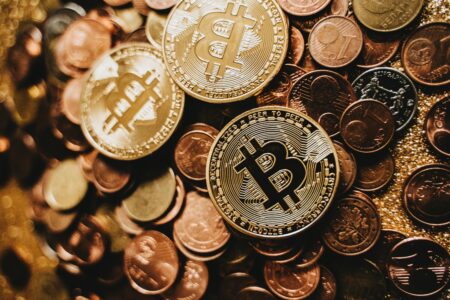Introduction
Inflation has long been a critical concern for economies worldwide. As central banks print money to support economic growth, the value of fiat currencies tends to decline over time. Investors have historically turned to assets like gold to protect their wealth from inflationary pressures. However, in recent years, Bitcoin has entered the conversation as a potential hedge against inflation. But is Bitcoin truly a reliable hedge, or is it merely a speculative asset? This article explores Bitcoin’s role in an inflationary environment and whether it lives up to its promise as “digital gold.”
Understanding Inflation and Its Impact
Inflation occurs when the purchasing power of a currency declines due to an increase in the money supply or rising costs of goods and services. While moderate inflation is considered normal in a growing economy, excessive inflation can erode savings and destabilize markets.
Historically, investors have sought refuge in scarce assets like gold, real estate, and commodities to hedge against inflation. These assets hold intrinsic value and are not easily manipulated by monetary policy. Bitcoin, with its fixed supply of 21 million coins, is often compared to gold as a store of value. But does it function in the same way?
Bitcoin as a Hedge Against Inflation
Bitcoin’s core proposition as an inflation hedge stems from its scarcity and decentralized nature. Unlike fiat currencies, which central banks can print at will, Bitcoin operates on a deflationary model with a predetermined supply cap. This scarcity creates a unique value proposition that mirrors gold’s role as a safe haven asset.
Several factors support Bitcoin’s position as a hedge against inflation:
- Limited Supply – Bitcoin’s 21 million coin cap prevents inflation through excessive supply expansion.
- Decentralization – Unlike government-issued currencies, Bitcoin is not controlled by any central authority.
- Global Accessibility – Bitcoin is a borderless asset, allowing anyone to hold and transact it regardless of economic conditions in their country.
- Institutional Adoption – Major financial institutions, corporations, and even governments are increasingly investing in Bitcoin as a reserve asset.
During periods of rising inflation, Bitcoin has often seen an increase in demand. For example, in 2020-2021, Bitcoin reached new all-time highs as central banks injected trillions of dollars into global markets to counteract the economic effects of the COVID-19 pandemic. Investors flocked to Bitcoin as a store of value, reinforcing its potential role as a hedge.
The Case Against Bitcoin as an Inflation Hedge
While Bitcoin presents compelling arguments as an inflation hedge, there are challenges that raise doubts about its reliability in this role. Some key concerns include:
- Volatility – Bitcoin’s price is notoriously volatile, with swings of 10% or more in a single day. Traditional inflation hedges like gold tend to be more stable.
- Correlation with Risk Assets – Bitcoin has often moved in tandem with equities and other speculative investments rather than acting as a counterbalance during economic downturns.
- Regulatory Uncertainty – Governments worldwide are still grappling with how to regulate Bitcoin, which adds an element of risk.
- Lack of Widespread Adoption – While Bitcoin adoption is growing, it is not yet a universally accepted medium of exchange or store of value like gold.
During inflationary periods, Bitcoin’s performance has been mixed. In some instances, it has surged alongside concerns over monetary debasement, but at other times, it has behaved more like a speculative asset, declining when markets correct.
Bitcoin vs. Gold: A Store of Value Debate
Gold has been the go-to asset for preserving wealth for centuries. It has a long history of holding value during inflationary periods. Bitcoin, being relatively new, does not yet have the same track record. However, proponents argue that Bitcoin offers unique advantages over gold, including:
- Portability – Bitcoin can be stored digitally and transferred globally within minutes, unlike gold, which requires physical storage and transportation.
- Divisibility – Bitcoin can be broken down into small units (satoshis), making it more practical for transactions.
- Transparency – The blockchain ensures Bitcoin’s supply and transactions are verifiable and immutable.
Despite these advantages, gold remains a less volatile and widely accepted asset, giving it a more established role as an inflation hedge. Bitcoin, on the other hand, is still in the early stages of proving its long-term stability.
Institutional Interest: The Changing Narrative
One of the strongest arguments for Bitcoin’s legitimacy as an inflation hedge is its growing adoption by institutional investors. Companies like Tesla, MicroStrategy, and Square have allocated billions into Bitcoin as part of their treasury strategy. Additionally, countries like El Salvador have made Bitcoin legal tender, signaling a shift toward broader acceptance.
Moreover, financial products such as Bitcoin ETFs and custodial services offered by major banks suggest that Bitcoin is being integrated into traditional financial markets. This increased institutional involvement may help stabilize Bitcoin’s price over time and strengthen its role as a store of value.
Conclusion: A Hedge or a Speculative Asset?
Bitcoin’s role as an inflation hedge remains a topic of debate. While its scarcity and decentralized nature make it an attractive alternative to fiat currencies, its volatility and correlation with risk assets raise concerns about its reliability in turbulent economic conditions.
For long-term believers, Bitcoin represents a digital store of value that could eventually rival gold. However, for conservative investors, its speculative nature may be a deterrent. Ultimately, Bitcoin’s effectiveness as an inflation hedge will depend on continued adoption, regulatory developments, and market maturity.
As the financial landscape evolves, Bitcoin’s role may become clearer, but for now, it sits at the intersection of hedge and speculation—a revolutionary asset still proving its place in the global economy.










